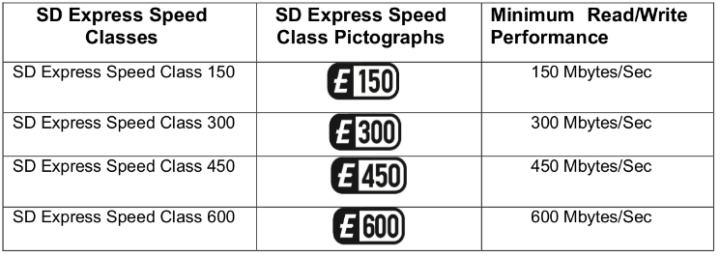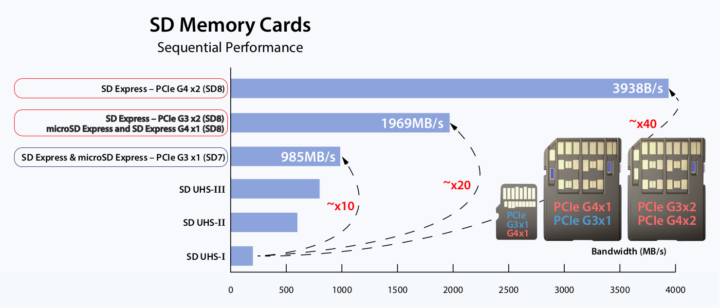SD Association (SDA) has announced the new SD 9.1 specification that doubles the speed of microSD Express memory card speed up to 2GB/s, defines four new SD Express Speed Classes to ensure guaranteed minimum sequential performance levels, and adds support for multi-stream access and related power and thermal management to assure the guaranteed performance.
We first covered the microSD Express cards in 2019 as they were added to the SD 7.0 specification with promises of SSD performance through a PCIe 3.0 interface delivering up to 985MB/s. Over four years have passed since then, and I have yet to write about devices supporting the new standard, but the SD Association is not giving up with the introduction of the SD 9.1 specification that doubles the speed of the microSD Express cards, and full-size SD Express card can even reach close to 4GB/s.
More specifically, the maximum speed achievable on microSD Express over a PCIe Gen4 x1 interface will be 1,969 MB/s. The new cards remain backward compatible with the existing microSD card standard at the lower UHS speeds, while the PCIe interface is enabled by new pins as can be seen in the diagram above.
 The new SD 9.1 specification also defines four SD Express classes with minimum guaranteed speeds with the E150 (150 MB/s), E300, E450, and E600 pictograms that will be found on microSD and SD Express cards sold in the future.
The new SD 9.1 specification also defines four SD Express classes with minimum guaranteed speeds with the E150 (150 MB/s), E300, E450, and E600 pictograms that will be found on microSD and SD Express cards sold in the future.
Three new features for the SD Express Speed Class specification 9.1 have also been defined:
- Power Management through Maximum Power (MP) values as defined by the host device
- Thermal Management where the card indicates a group of its specific thermal thresholds.
- Access Rule for Multi-stream Recording to ensure the minimum defined performance of the PCI/NVMe interface in SD Express cards, including multi-stream access of up to eight streams
Additional details may be found in the press release and a white paper about the new features added to the SD 9.1 specification. I also had a quick look at “microSD Express” cards on Amazon, and none showed up, with the results showing CFExpress cards instead, so while several companies have announced microSD and SD Express cards, they don’t seem to be commercially available just yet. Adoption will take a while and it’s unclear whether those types of SD cards will ever be broadly adopted.
Thanks to TLS for the tip.

Jean-Luc started CNX Software in 2010 as a part-time endeavor, before quitting his job as a software engineering manager, and starting to write daily news, and reviews full time later in 2011.
Support CNX Software! Donate via cryptocurrencies, become a Patron on Patreon, or purchase goods on Amazon or Aliexpress





